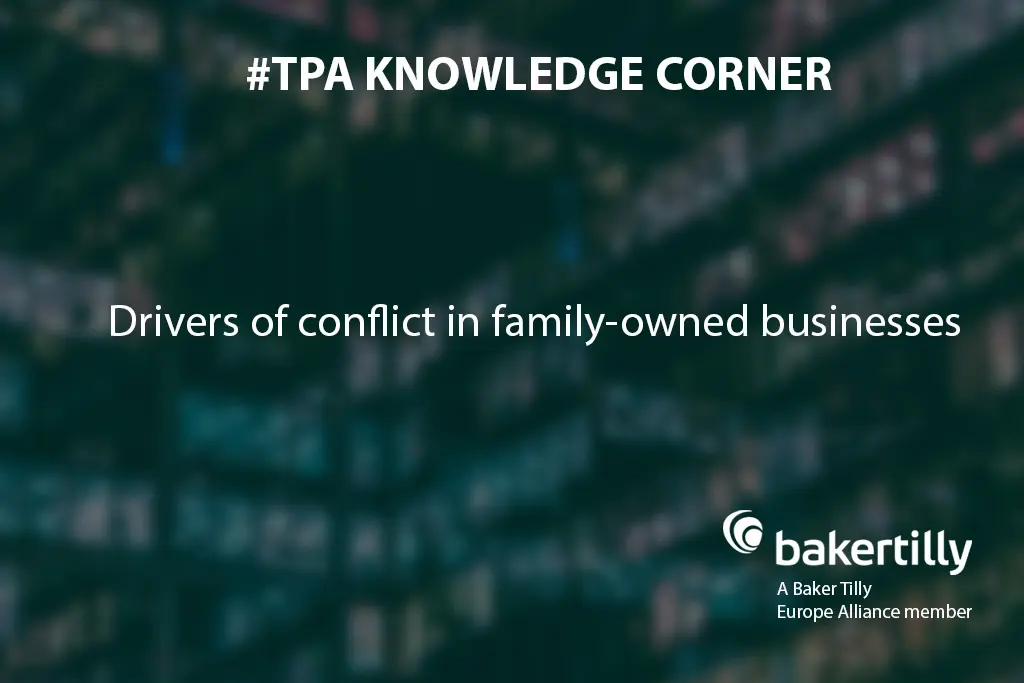13. March 2023
Reading Time: 5
Min.
news
Drivers of conflict in family-owned businesses

Family-owned businesses can be a source of great pride and success, but they can also be a breeding ground for conflict. Understanding the causes of conflict in these businesses can help mitigate potential issues and create a more harmonious and productive work environment.
After advising family-owned businesses for many years, we have identified a set of common drivers of conflict in family-owned businesses. We have also developed a list of actions to prevent the onset of conflict in family-owned businesses (see the next article “Preventing conflict in family-owned businesses”).
Here are some of the most common drivers of conflict in family-owned businesses:
Lack of clear roles and responsibilities: In a family-owned business, it is common for family members to have multiple roles and responsibilities. This can lead to confusion and conflict if there is a lack of clarity around who is responsible for what. In a family business, it can be difficult to separate personal relationships from professional ones, which can lead to misunderstandings and conflict. Establishing clear lines of communication and defining roles and responsibilities can help reduce the likelihood of conflict arising.
Lack of planning (leadership succession and/or ownership transition): When the future leadership of the business is unclear, family members may jostle for position and power, leading to tension and conflict. Deciding who will take over the business and when can be a contentious issue, especially if there are multiple family members who want to be involved in the business. Establishing a clear succession plan and communicating it to all family members can help avoid these issues. When it comes to ownership succession, the current generation is sometimes conflicted over how to transition the business assets and if they should be distributed based upon contribution, ability, interest, experience or just birthright. “Equal is not always fair” and “fair is not always equal” in family businesses. Sometimes lack of thoughtful planning can create the appearance of favoritism and create conflict in the family and the business.
Differing values, goals, and family vision: Family members may have different values and goals and may lack a shared vision. This can lead to conflict as they try to steer the business in different directions. For instance, if one family member is focused on growth and expansion while another is more interested in preserving the company’s legacy, this can lead to disagreement and conflict. It’s important for family members to openly discuss their values and goals for the business and try to find a way to align them by creating a shared vision for the family enterprise.
Differences in work ethic: Family members may have different levels of dedication to the business, which can lead to conflict if one person feels that another is not pulling their weight. Generational differences regarding entitlement, work ethic and dedication to the family enterprise will drive conflict in family enterprises.
Power struggles: In a family-owned business, power dynamics can be complex, with different family members vying for control. This can lead to conflict if there is a perceived imbalance of power. Oftentimes, these power imbalances are manifested and increase as ownership is diluted over the generations.
Treating family members differently than employees: Family members need to understand when they are wearing their “employer/employee hat” vs. their “family-member hat.” Conflict may arise when family members feel that they are being micromanaged or not given the autonomy they need to do their jobs effectively or they are being treated differently than other employees. Allowing family members the freedom to make decisions and take ownership of their work can help foster a sense of trust and reduce the likelihood of conflict. On the flip side, treating family members inside the business more favorably than non-family employees will cause resentment, bitterness and lower morale and productivity amongst the employee group.
Lack of family governance structure: Another driver that we observe is the lack of family governance structure and policies, particularly those that expressly address family shareholder, family employment and family and leadership decision-making responsibilities and parameters. Examples would include buy/sell agreements, prenuptial guidelines, family employment and termination policies and family compensation guidelines.

Jealousy and favoritism: Conflict can arise when family members feel that they are being treated unfairly or not given the same opportunities as others. Ensuring that all family members are treated equally and given equal opportunities to contribute to the business can help mitigate these conflicts.
Lack of approach to address family conflict: Additionally, many families do not have an approach to solve family conflict. Absent any structure to address conflict, it will continue to fester and ultimately may negatively affect the value of the business and the strength of family relationships.
Greed: Finally, it will come as no surprise that greed is a very common cause of conflict in family businesses. We have observed greed rearing its ugly head in many ways in family businesses. Sometimes, uninvolved family members expect returns from businesses for which they don’t contribute. Other times “silent” family owners believe that operating owners are taking too much money out of the business through compensation or other paid benefits or perhaps there is disagreement over re-investment vs. cash distribution plans. Other times, parents’ desire for equality amongst the siblings does not align with the value contributed by the individual family member. Additionally, we also see the next generation taking advantage of the older generation for their own financial benefit. After advising many ultra-high net worth families, our conclusion is that a sense of “familiness” is priceless and is ultimately what families really desire to honor past generations and to maintain the family legacy. No incremental amount of money is worth having family members sue each other, not speak to each other for years, demand to be bought out of the business or not spend holidays together.
Overall, conflict in family-owned businesses is common but can be managed effectively with open communication, clear roles and responsibilities, a defined plan, shared values, goals and vision, proper governance, and a sense of trust and autonomy among family members.
Source: BakerTilly





